Sorry maybe my eyesight is bad can you refer to the specific quotes from them. I’m having trouble reading that I see Mooney mentioned but not much elseAntiliar wrote: ↑Fri Jul 03, 2020 11:36 pm It was an explanation about belief claims and knowledge claims about evidence.
This is Accardo and Giancana discussing their interactions with other leaders
FBI Su Anthony Accardo ELSUR (1959) - Commission.jpg
Here Fratianno used the word "captain" but the FBI added "capo"
FBI Su Richard Cain - Fratianno.jpg
Chicago and the Camorra
Moderator: Capos
Re: Chicago and the Camorra
I agree with phat,I love those old fucks and he's right.we all got some cosa nostra in us.I personnely love the life.I think we on the forum would be the ultimate crew! - camerono
Re: Chicago and the Camorra
I don't think they were disputed. They used the same terms as the other Families when they needed to.Pete wrote: ↑Sat Jul 04, 2020 12:37 amWas capo or captain disputed? I got nick c referring to difronzo and lapietra as capos or captains. Some guys used Italian more than others. When Angelo went to jail he told nick his brother jimmy was sotto capo while he was away. Fratianno also said when he met with aiuppa and cerone they were boss and underboss and cerone referred to spilotro as a soldier.Antiliar wrote: ↑Fri Jul 03, 2020 11:36 pm It was an explanation about belief claims and knowledge claims about evidence.
This is Accardo and Giancana discussing their interactions with other leaders
FBI Su Anthony Accardo ELSUR (1959) - Commission.jpg
Here Fratianno used the word "captain" but the FBI added "capo"
FBI Su Richard Cain - Fratianno.jpg
Re: Chicago and the Camorra
Its quite interesting that whenever the Chi boys referred to other families, especially around the east coast, they usually only talked about the boss or the underboss of some specific family, they almost never mentioned any other high level statures but the most interesting thing was that they rarely knew on who was the boss or underboss in other families.
In some previous talks between Accardo and Giancana, the former boss or Joe B describes to Momo the whole commission and who was on it, besides Giancana being the underboss for almost 9 years....it seems that the Outfits top admin rarely cared about who was who in other families, except for their accomplices the Genoveses since Giancana was aware only about Vito and maybe Tommy Brown.
Another example is when Cerone (capo) explained to Ferraro (underboss) about who were the top guys in the Rockford family....i mean they were in their own state and both families were closely connected in numerous ventures, but still it seems that the Outfits top admin didnt care much about it.
And my last and best example is one convo that occurred in 1972 or right before Ricca was hospitalized and later died, that was between him and Accardo during a lunch in some Northwest Side restaurant, possibly on Grand Av. During their lunch, they mostly talked about and were disgusted by the Tommy Eboli murder and they also mentioned the Colombo problem, and by the end of the meeting both oldtimers closed their dialog with Accardo stating "Better them than us," followed by Ricca "You're right, Joe, better them than us." With these last statements, they definitely showed that they really didnt care much about the national organization at the time.
This is another proof that the Chicago Outfit always had their own closed circle and was always different than the rest.
In some previous talks between Accardo and Giancana, the former boss or Joe B describes to Momo the whole commission and who was on it, besides Giancana being the underboss for almost 9 years....it seems that the Outfits top admin rarely cared about who was who in other families, except for their accomplices the Genoveses since Giancana was aware only about Vito and maybe Tommy Brown.
Another example is when Cerone (capo) explained to Ferraro (underboss) about who were the top guys in the Rockford family....i mean they were in their own state and both families were closely connected in numerous ventures, but still it seems that the Outfits top admin didnt care much about it.
And my last and best example is one convo that occurred in 1972 or right before Ricca was hospitalized and later died, that was between him and Accardo during a lunch in some Northwest Side restaurant, possibly on Grand Av. During their lunch, they mostly talked about and were disgusted by the Tommy Eboli murder and they also mentioned the Colombo problem, and by the end of the meeting both oldtimers closed their dialog with Accardo stating "Better them than us," followed by Ricca "You're right, Joe, better them than us." With these last statements, they definitely showed that they really didnt care much about the national organization at the time.
This is another proof that the Chicago Outfit always had their own closed circle and was always different than the rest.
Do not be deceived, neither the sexually immoral, nor idolaters, nor adulterers, nor men who practice homosexuality, nor thieves, nor the greedy, nor drunkards, nor revilers, nor swindlers will inherit the kingdom of God - Corinthians 6:9-10
- Grouchy Sinatra
- Full Patched
- Posts: 1800
- Joined: Fri Apr 19, 2019 11:33 pm
Re: Chicago and the Camorra
I think the American mafia always resembled the Camorra more than the Sicilian mafia, especially since the commission was formed in 1931. The misnomer of comparing the American mob to the Sicilian mafia probably comes from the popularity of The Godfather. Vito was mostly based on Frank Costello, a Calabrese, who was all business and adhered to practically no Sicilian traditions. In Joe Bonanno's book he says that Al Capone shouldn't have even been made. lol.
Glick told author Nicholas Pileggi that he expected to meet a banker-type individual, but instead, he found Alvin Baron to be a gruff, tough-talking cigar-chomping Teamster who greeted him with, “What the fuck do you want?”
- PolackTony
- Filthy Few
- Posts: 5830
- Joined: Thu May 28, 2020 10:54 am
- Location: NYC/Chicago
Re: Chicago and the Camorra
So one takeway from this debate is that we have no evidence that Chicago ever used the term "consigliere" internally. While that's one point (and what we can and should reasonably infer from the evidence or lack thereof on this question), another question is whether the role of someone like Accardo or Ricca when they served as something like a "boss emeritus" was functionally or operationally equivalent to the formally instituted office of consigliere used in other families. While I don't think that anyone here would be arguing that the Outfit was exactly the same either organizationally or operationally as other families (the motivation for starting this thread is of course premised on this understanding), what can we say in a more granular and rigorous fashion about both the similarities and differences? Regardless of the terminoloy used, do we define "consigliere" or an equivalent position as the paradigmatic role of an advisor elected by the membership fo the family? Or could the concept also apply to someone appointed by the boss (as in Buffalo IIRC) or to a senior boss emeritus holding an advisory role due to longstanding recognition as a powerful and influential figure within the family?
People may have already seen this, but I'm including a section from a Ft Lauderdale PD report from 1967 summarizing LE intelligence on CN. I'm not referring to this report because I believe that it is necessarily an accurate depiction of actual structures and practices necessarily, but because it does define the role of consigliere as a boss emeritus. This may of course be due to conflating the advisory position in Chicago with the formal and elected consiglieri of other families. But do we have examples from other families of the consigliere being a senior emeritus advisor?

Here's another interesting document. Again, not saying that this should be taken as an accurate depiction of the Outfit's internal nomenclature or even structural organization. Perhaps it's just an example of LE fitting the Outfit into the available "LCN" paradigm. But it brings up the question of, regardless of terminology, whether the structural differences between the Outfit and other families were significant enough that this paradigm was entirely inappropriate:

Again, the discussion of nomenclature and terminology is one question, the problem of formal and functional roles is another. At what point did guys in other families stop using the term "capodecina"? The role didn't change when they started referring to them as skippers or whatever. And maybe we have no evidence that Chicago ever used the specific term "capodecina". But they did use capo to refer to crew bosses. And the fact that they used "boss" to refer to someone like Lombardo doesn't mean that "capo" wasn't used interchangeably to refer to him. "Boss" is, after all, the more accurate translation of Capo (as compared to say "captain" or "skipper"). If it were the case that Angelo LaPietra referred to Jimmy as a "sotto capo" that is also very interesting, as of course a sotto capo is an "underboss". For me this brings up the question of whether the territorial crews of the Outfit were somewhat akin to distinct "families", tied together under a centralized leadership panel composed of the bosses of the most powerful "families" that also controlled the wider Chicago crime syndicate network. Over the years people on these forums have speculated that Chicago might be conceptualized along those lines. I think back again to Chicago hitman Gerry DeNono's interview in an old BBC documentary where he referred to Outfit crews as "families".
People may have already seen this, but I'm including a section from a Ft Lauderdale PD report from 1967 summarizing LE intelligence on CN. I'm not referring to this report because I believe that it is necessarily an accurate depiction of actual structures and practices necessarily, but because it does define the role of consigliere as a boss emeritus. This may of course be due to conflating the advisory position in Chicago with the formal and elected consiglieri of other families. But do we have examples from other families of the consigliere being a senior emeritus advisor?

Here's another interesting document. Again, not saying that this should be taken as an accurate depiction of the Outfit's internal nomenclature or even structural organization. Perhaps it's just an example of LE fitting the Outfit into the available "LCN" paradigm. But it brings up the question of, regardless of terminology, whether the structural differences between the Outfit and other families were significant enough that this paradigm was entirely inappropriate:

Again, the discussion of nomenclature and terminology is one question, the problem of formal and functional roles is another. At what point did guys in other families stop using the term "capodecina"? The role didn't change when they started referring to them as skippers or whatever. And maybe we have no evidence that Chicago ever used the specific term "capodecina". But they did use capo to refer to crew bosses. And the fact that they used "boss" to refer to someone like Lombardo doesn't mean that "capo" wasn't used interchangeably to refer to him. "Boss" is, after all, the more accurate translation of Capo (as compared to say "captain" or "skipper"). If it were the case that Angelo LaPietra referred to Jimmy as a "sotto capo" that is also very interesting, as of course a sotto capo is an "underboss". For me this brings up the question of whether the territorial crews of the Outfit were somewhat akin to distinct "families", tied together under a centralized leadership panel composed of the bosses of the most powerful "families" that also controlled the wider Chicago crime syndicate network. Over the years people on these forums have speculated that Chicago might be conceptualized along those lines. I think back again to Chicago hitman Gerry DeNono's interview in an old BBC documentary where he referred to Outfit crews as "families".
"Hey, hey, hey — this is America, baby! Survival of the fittest.”
- PolackTony
- Filthy Few
- Posts: 5830
- Joined: Thu May 28, 2020 10:54 am
- Location: NYC/Chicago
Re: Chicago and the Camorra
Not sure why the FBI Doc displayed so small in the above post. I'm posting it again:

jim montgomery salary

jim montgomery salary
"Hey, hey, hey — this is America, baby! Survival of the fittest.”
Re: Chicago and the Camorra
Ricca and Accardo didnt just advise the boss but instead they were the ones who had the power to place or remove the bosses. In addition, that last file you posted is one good proof on how the feds at the time tried to connect the Outfit to the same CN hierarchy, but as we can see, that is why they obviously failed. They already had numerous files regarding Cerone being the boss during that period, followed by Buccieri as the number two guy....
Heres just few files regarding Riccas and Accardos statures and the Cerone/Buccieri situation...


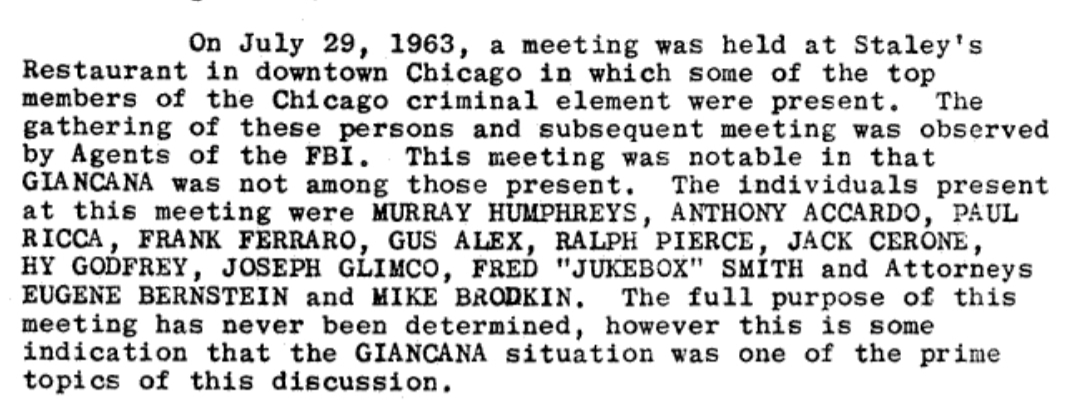
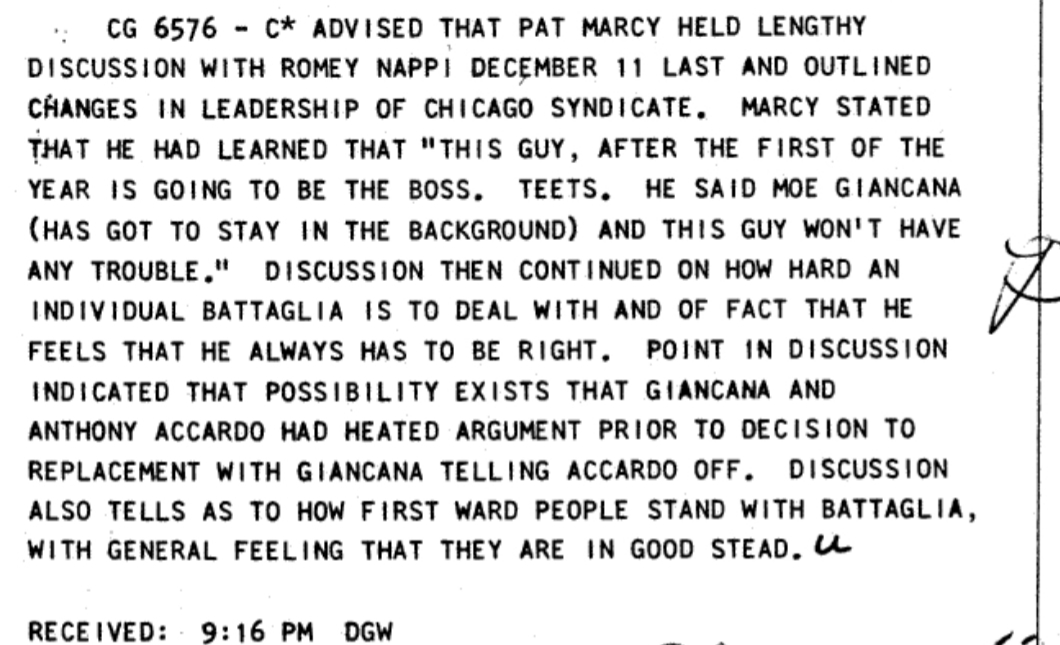
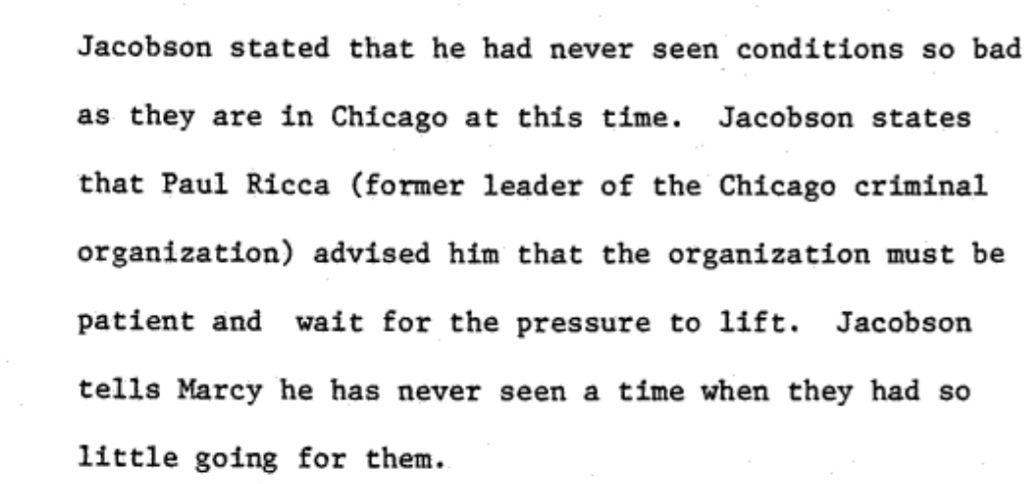
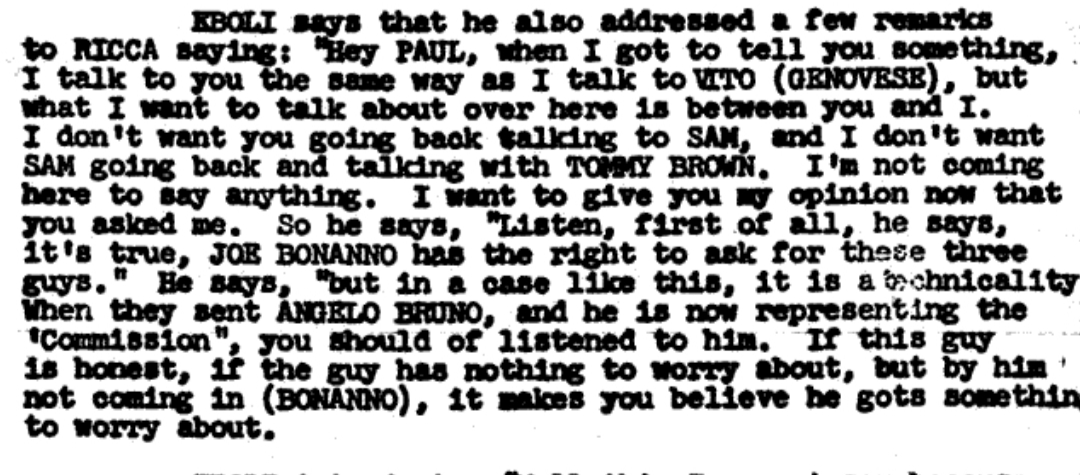

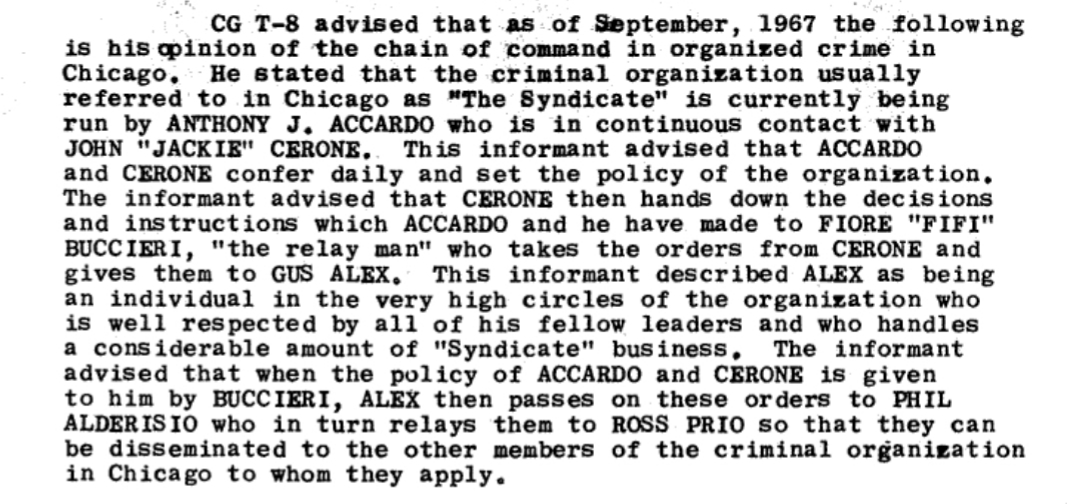
Heres just few files regarding Riccas and Accardos statures and the Cerone/Buccieri situation...








Do not be deceived, neither the sexually immoral, nor idolaters, nor adulterers, nor men who practice homosexuality, nor thieves, nor the greedy, nor drunkards, nor revilers, nor swindlers will inherit the kingdom of God - Corinthians 6:9-10
- PolackTony
- Filthy Few
- Posts: 5830
- Joined: Thu May 28, 2020 10:54 am
- Location: NYC/Chicago
Re: Chicago and the Camorra
Of course, the Feds could fail to capture who occupied particular roles while still providing a more or less useful picture of the organizational structure. Their idea that Alderisio played anything like a "consigliere" role is of course completely mistaken. But apart from the consigliere office, their notion of boss, underboss, and capidecina seems reasonable. Regardless of whatever terms used by particular individuals or within particular families at different times, I don't know that this basic structure was significantly different between Chicago and other families in any formal or functional way.Villain wrote: ↑Sat Jul 04, 2020 12:52 pm Ricca and Accardo didnt just advise the boss but instead they were the ones who had the power to place or remove the bosses. In addition, that last file you posted is one good proof on how the feds at the time tried to connect the Outfit to the same CN hierarchy, but as we can see, that is why they obviously failed. They already had numerous files regarding Cerone being the boss during that period, followed by Buccieri as the number two guy....
And as for Ricca and Accardo, I always wonder to what degree their authority in the period was considered a normal part of whatever explicit role they occupied, or just an emergency measure due to exigencies of the circumstances regarding Giancana's failings and then Battaglia being locked up. During the stable periods earlier in Giancana's tenure, was their day to day, pragmatic role roughly equivalent to a consigliere? And then in the case of an emergency situation they had the authority and seniority to step in and regulate things until a new formal leadership could be appointed? I feel like there's is still a lot both organizationally and operationally that we don't know or fully understand here (of course this could just be a product of my own ignorance).
"Hey, hey, hey — this is America, baby! Survival of the fittest.”
- PolackTony
- Filthy Few
- Posts: 5830
- Joined: Thu May 28, 2020 10:54 am
- Location: NYC/Chicago
Re: Chicago and the Camorra
In what specific ways has the American CN as a whole "resembled the Camorra more than the Sicilian mafia"? Sure, Cotello and Genovese were not Sicilians (and Luciano before them was himself far from being a Mustache Pete traditionalist) but in what ways did the formal or functional workings of the Genovese family, for example, reflect Camorra influences over those derived or adapted from the Sicilian Mafia?Grouchy Sinatra wrote: ↑Sat Jul 04, 2020 10:46 am I think the American mafia always resembled the Camorra more than the Sicilian mafia, especially since the commission was formed in 1931. The misnomer of comparing the American mob to the Sicilian mafia probably comes from the popularity of The Godfather. Vito was mostly based on Frank Costello, a Calabrese, who was all business and adhered to practically no Sicilian traditions. In Joe Bonanno's book he says that Al Capone shouldn't have even been made. lol.
"Hey, hey, hey — this is America, baby! Survival of the fittest.”
Re: Chicago and the Camorra
Well they obviously didnt care about anything if things went smooth. They were the ones who made the situation smooth by choosing the right candidate and if something went wrong, again they were the ones who made the final decisions. Dont get me wrong, but i really dont unserstand that "operational" thing but the reality is that those two made all policies for the organization....operational or notPolackTony wrote: ↑Sat Jul 04, 2020 1:35 pmOf course, the Feds could fail to capture who occupied particular roles while still providing a more or less useful picture of the organizational structure. Their idea that Alderisio played anything like a "consigliere" role is of course completely mistaken. But apart from the consigliere office, their notion of boss, underboss, and capidecina seems reasonable. Regardless of whatever terms used by particular individuals or within particular families at different times, I don't know that this basic structure was significantly different between Chicago and other families in any formal or functional way.Villain wrote: ↑Sat Jul 04, 2020 12:52 pm Ricca and Accardo didnt just advise the boss but instead they were the ones who had the power to place or remove the bosses. In addition, that last file you posted is one good proof on how the feds at the time tried to connect the Outfit to the same CN hierarchy, but as we can see, that is why they obviously failed. They already had numerous files regarding Cerone being the boss during that period, followed by Buccieri as the number two guy....
And as for Ricca and Accardo, I always wonder to what degree their authority in the period was considered a normal part of whatever explicit role they occupied, or just an emergency measure due to exigencies of the circumstances regarding Giancana's failings and then Battaglia being locked up. During the stable periods earlier in Giancana's tenure, was their day to day, pragmatic role roughly equivalent to a consigliere? And then in the case of an emergency situation they had the authority and seniority to step in and regulate things until a new formal leadership could be appointed? I feel like there's is still a lot both organizationally and operationally that we don't know or fully understand here (of course this could just be a product of my own ignorance).
Also what about after Riccas death? Alex and Aiuppa couldnt lift a finger without Accardos approval....some "advisory" role dont you think?
Last edited by Villain on Sat Jul 04, 2020 1:56 pm, edited 2 times in total.
Do not be deceived, neither the sexually immoral, nor idolaters, nor adulterers, nor men who practice homosexuality, nor thieves, nor the greedy, nor drunkards, nor revilers, nor swindlers will inherit the kingdom of God - Corinthians 6:9-10
- Grouchy Sinatra
- Full Patched
- Posts: 1800
- Joined: Fri Apr 19, 2019 11:33 pm
Re: Chicago and the Camorra
Putting business above tradition. Camorra was about business and corruption from the start. They formed in prison. Their origins were literally in organized crime. The Sicilian mafia traditions are based in village feuds. Corruption came later.PolackTony wrote: ↑Sat Jul 04, 2020 1:42 pm
In what specific ways has the American CN as a whole "resembled the Camorra more than the Sicilian mafia"? Sure, Cotello and Genovese were not Sicilians (and Luciano before them was himself far from being a Mustache Pete traditionalist) but in what ways did the formal or functional workings of the Genovese family, for example, reflect Camorra influences over those derived or adapted from the Sicilian Mafia?
The Luciano/Genovese family wrote the book on putting business above tradition, much to the chagrin of the more Sicilian-centric bosses like Bonanno and Profaci. Many among the hard core Sicilian faction didn't even believe non Sicilians should be made.
Glick told author Nicholas Pileggi that he expected to meet a banker-type individual, but instead, he found Alvin Baron to be a gruff, tough-talking cigar-chomping Teamster who greeted him with, “What the fuck do you want?”
- PolackTony
- Filthy Few
- Posts: 5830
- Joined: Thu May 28, 2020 10:54 am
- Location: NYC/Chicago
Re: Chicago and the Camorra
Well if the advisory role was itself predicated on their legacy of prestige and power within the family then I don't think that their role under what were clearly extraordinary, crisis conditions necessarily means that they didn't serve a mostly advisory role during "normal" operating conditions (not saying that this an argument that you're necessarily making of course). In what may not be an apt analogy, a reading of the US gov in exceptional wartime or martial law conditions doesn't tell us much about how things are run under normal conditions. This account here does give us an sense that Ricca and Accardo stepping in was seen as a provisional and temporary move to shore up stability:Villain wrote: ↑Sat Jul 04, 2020 1:43 pm Well they obviously didnt care about anything if things went smooth. They were the ones who made the situation smooth by choosing the right candidate and if something went wrong, again they were the ones who made the final decisions. Dont get me wrong, but i really dont unserstand that "operational" thing but the reality is that those two made all policies for the organization....operational or not
Also what about after Riccas death? Alex and Aiuppa couldnt lift a finger without Accardos approval....some "advisory" role dont you think?

To put things back in a comparative framework, if there were examples in other families where the "consigliere" was a senior advisory emeritus position do we think it isn't plausible that a similar situation could have arisen in other families in a similar crisis of leadership? Do we have any roughly parallel examples, or examples where someone who formally/organizationally served in an advisory or "consigliere" role exercised boss-level authority or decision making powers in a functional or operational sense?
"Hey, hey, hey — this is America, baby! Survival of the fittest.”
Re: Chicago and the Camorra
As i already told you...when things went smooth, they advised or whatever, but when things went bad, they were the ones who decided on who was going to be their new chief executive, or underboss or whatever. Do you think that a "consigliere" like in NY can shut down all illegal ops around the Loop? I dont think so....PolackTony wrote: ↑Sat Jul 04, 2020 1:59 pmWell if the advisory role was itself predicated on their legacy of prestige and power within the family then I don't think that their role under what were clearly extraordinary, crisis conditions necessarily means that they didn't serve a mostly advisory role during "normal" operating conditions (not saying that this an argument that you're necessarily making of course). In what may not be an apt analogy, a reading of the US gov in exceptional wartime or martial law conditions doesn't tell us much about how things are run under normal conditions. This account here does give us an sense that Ricca and Accardo stepping in was seen as a provisional and temporary move to shore up stability:Villain wrote: ↑Sat Jul 04, 2020 1:43 pm Well they obviously didnt care about anything if things went smooth. They were the ones who made the situation smooth by choosing the right candidate and if something went wrong, again they were the ones who made the final decisions. Dont get me wrong, but i really dont unserstand that "operational" thing but the reality is that those two made all policies for the organization....operational or not
Also what about after Riccas death? Alex and Aiuppa couldnt lift a finger without Accardos approval....some "advisory" role dont you think?
To put things back in a comparative framework, if there were examples in other families where the "consigliere" was a senior advisory emeritus position do we think it isn't plausible that a similar situation could have arisen in other families in a similar crisis of leadership? Do we have any roughly parallel examples, or examples where someone who formally/organizationally served in an advisory or "consigliere" role exercised boss-level authority or decision making powers in a functional or operational sense?
Do not be deceived, neither the sexually immoral, nor idolaters, nor adulterers, nor men who practice homosexuality, nor thieves, nor the greedy, nor drunkards, nor revilers, nor swindlers will inherit the kingdom of God - Corinthians 6:9-10
Re: Chicago and the Camorra
In addition, heres one interesting example regarding Accardos "consigliere" role....same as Ricca, we are again obviously looking at a top boss...
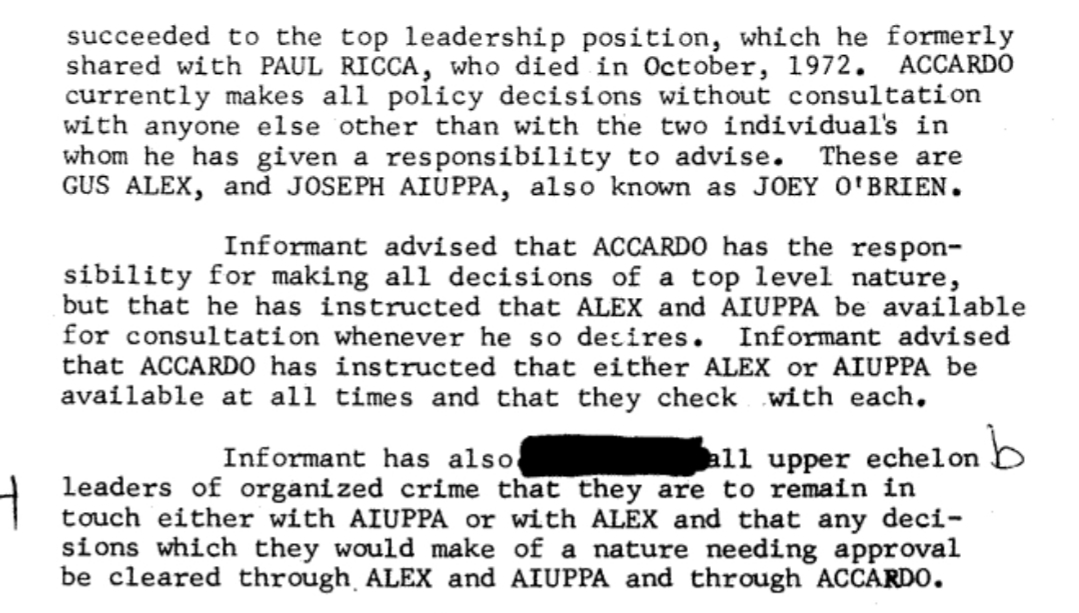

Do not be deceived, neither the sexually immoral, nor idolaters, nor adulterers, nor men who practice homosexuality, nor thieves, nor the greedy, nor drunkards, nor revilers, nor swindlers will inherit the kingdom of God - Corinthians 6:9-10
Re: Chicago and the Camorra
Heres one info regarding the top boss position....

And another one regarding the senior adviser/semi-retired position...


And another one regarding the senior adviser/semi-retired position...

Do not be deceived, neither the sexually immoral, nor idolaters, nor adulterers, nor men who practice homosexuality, nor thieves, nor the greedy, nor drunkards, nor revilers, nor swindlers will inherit the kingdom of God - Corinthians 6:9-10